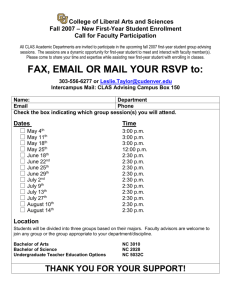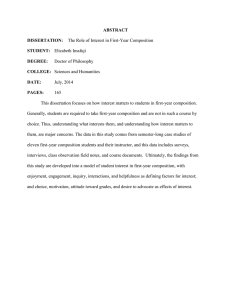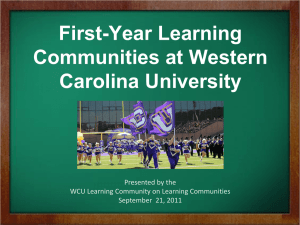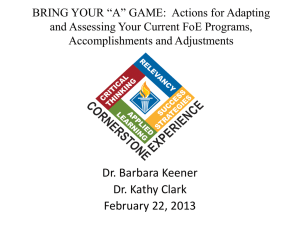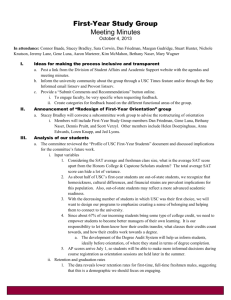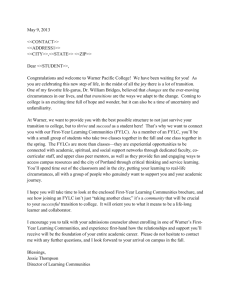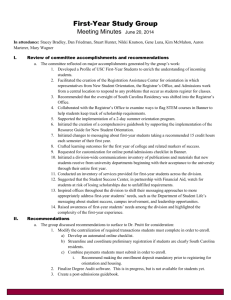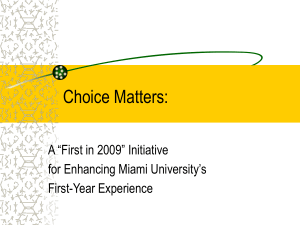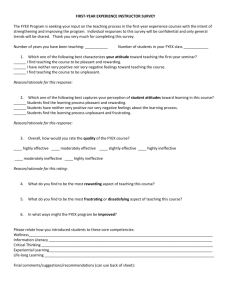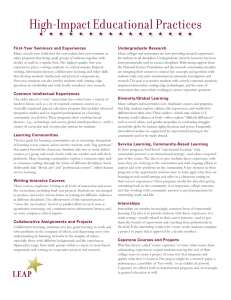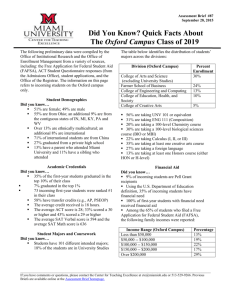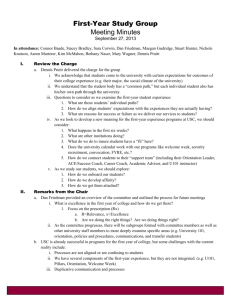Minutes - Student Affairs and Academic Support
advertisement
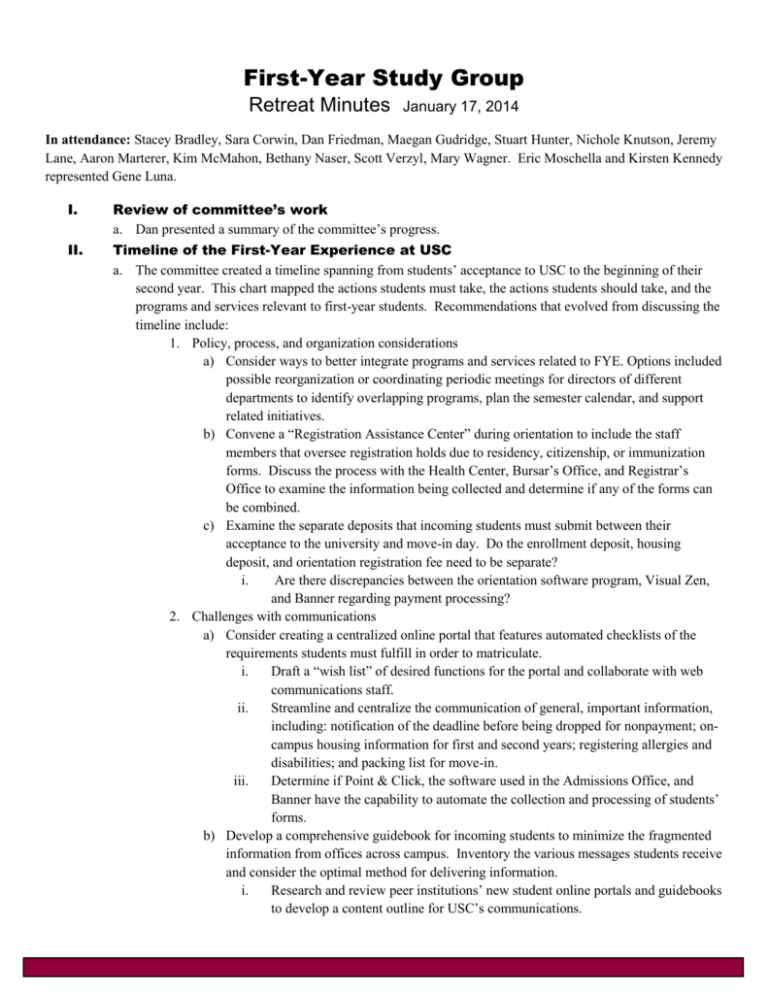
First-Year Study Group Retreat Minutes January 17, 2014 In attendance: Stacey Bradley, Sara Corwin, Dan Friedman, Maegan Gudridge, Stuart Hunter, Nichole Knutson, Jeremy Lane, Aaron Marterer, Kim McMahon, Bethany Naser, Scott Verzyl, Mary Wagner. Eric Moschella and Kirsten Kennedy represented Gene Luna. I. Review of committee’s work a. Dan presented a summary of the committee’s progress. II. Timeline of the First-Year Experience at USC a. The committee created a timeline spanning from students’ acceptance to USC to the beginning of their second year. This chart mapped the actions students must take, the actions students should take, and the programs and services relevant to first-year students. Recommendations that evolved from discussing the timeline include: 1. Policy, process, and organization considerations a) Consider ways to better integrate programs and services related to FYE. Options included possible reorganization or coordinating periodic meetings for directors of different departments to identify overlapping programs, plan the semester calendar, and support related initiatives. b) Convene a “Registration Assistance Center” during orientation to include the staff members that oversee registration holds due to residency, citizenship, or immunization forms. Discuss the process with the Health Center, Bursar’s Office, and Registrar’s Office to examine the information being collected and determine if any of the forms can be combined. c) Examine the separate deposits that incoming students must submit between their acceptance to the university and move-in day. Do the enrollment deposit, housing deposit, and orientation registration fee need to be separate? i. Are there discrepancies between the orientation software program, Visual Zen, and Banner regarding payment processing? 2. Challenges with communications a) Consider creating a centralized online portal that features automated checklists of the requirements students must fulfill in order to matriculate. i. Draft a “wish list” of desired functions for the portal and collaborate with web communications staff. ii. Streamline and centralize the communication of general, important information, including: notification of the deadline before being dropped for nonpayment; oncampus housing information for first and second years; registering allergies and disabilities; and packing list for move-in. iii. Determine if Point & Click, the software used in the Admissions Office, and Banner have the capability to automate the collection and processing of students’ forms. b) Develop a comprehensive guidebook for incoming students to minimize the fragmented information from offices across campus. Inventory the various messages students receive and consider the optimal method for delivering information. i. Research and review peer institutions’ new student online portals and guidebooks to develop a content outline for USC’s communications. First-Year Study Group Retreat Minutes 3. 4. 5. 6. January 17, 2014 c) Assemble an individualized “support team” for students, accessible online, including staff members that provide integral services for first-year students. Examples include the student’s academic advisor, ACE Coach, Career Coach, and University 101 Peer Leader. Challenges with advising a) Provide advisors and colleges with consistent communication regarding selecting a major and career exploration. b) Consider the option of pre-registering students for courses and allowing them to revise their schedule during orientation. Career exploration a) Many students decide to switch majors or panic about career paths during orientation. i. Devise a plan to incorporate career exploration throughout the year by guiding purposeful discussions in University 101, residence halls, and advising appointments. ii. Develop a presentation or materials, to be shared during orientation, that educate students on the process of changing majors. iii. Hold drop-in hours during orientation at the Student Success Center for students to meet with a Cross-College Advisor or Career Coach after meeting with College. Promoting student success and optimizing the early alert program a) Request that all faculty submit midterm grades and monitor the timely submission of final grades. b) Notify and consult students that are at-risk for losing scholarships. i. For the Life scholarship, track STEM enhancement eligible courses with course attributes in order for the Registrar and Financial Aid to determine if students meet scholarship qualifications. ii. Develop an automated scholarship checklist in Degree Works and utilize the Curriculum Advising Planning Program (CAPP). c) Identify students considering transferring or withdrawing by monitoring requests for transcripts or students who do not register for fall courses. Connect these students with the SSC for withdrawal counseling or exit interviews. d) Follow up with students on academic probation beyond the ACE mandate. Other topics to consider a) Identify “defining moments” of the first-year experience at Carolina and clearly communicate these to students. i. Compare lists of the most defining moments of the first-year experience according to students, faculty, and staff. b) Address the mental health and wellness needs of college students. Beginning at orientation, educate incoming students about prescriptions, counseling, and health services. c) Examine the timing of some campus-wide events, such as the Student Organization Fair. Is there a way to incorporate this into Welcome Week to avoid scheduling conflicts with students’ class schedules? d) Consider the reasons students begin to look for off-campus housing for their second year so early in the fall semester. Refine education about the availability and variety of First-Year Study Group Retreat Minutes January 17, 2014 housing options through University 101, residence halls, and Off-Campus Student Services. e) Incorporate additional opportunities for students to take the foreign language placement exam during orientation. III. Preparing for next meeting a. Prepare to discuss the recommendations and identify the most timely, relevant aspects to address. b. Plan to review the draft of the learning outcomes for the first-year experience.
